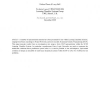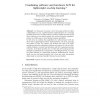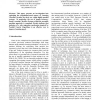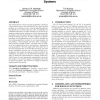164
click to vote
GECCO
2011
Springer
14 years 5 months ago
2011
Springer
—A number of representation schemes have been presented for use within Learning Classifier Systems, ranging from binary encodings to Neural Networks, and more recently Dynamical ...
118
click to vote
IFIP
2010
Springer
14 years 9 months ago
2010
Springer
In this paper we present a novel two-stage method to realize a lightweight but very capable hardware implementation of a Learning Classifier System for on-chip learning. Learning C...
113
click to vote
GECCO
2008
Springer
15 years 3 months ago
2008
Springer
For artificial entities to achieve high degrees of autonomy they will need to display appropriate adaptability. In this sense adaptability includes representational flexibility gu...
139
click to vote
GECCO
2008
Springer
15 years 3 months ago
2008
Springer
For artificial entities to achieve high degrees of autonomy they will need to display appropriate adaptability. In this sense adaptability includes representational flexibility gu...
118
click to vote
CEC
2005
IEEE
15 years 4 months ago
2005
IEEE
This paper presents an investigation into exploiting the population-based nature of Learning Classifier Systems for their use within highly-parallel systems. In particular, the use...
110
click to vote
GECCO
2000
Springer
15 years 5 months ago
2000
Springer
ected Abstracts for the First International Workshop on Learning Classifier System (IWLCS92), 1992. October 6
133
click to vote
GECCO
2006
Springer
15 years 5 months ago
2006
Springer
This paper presents the design and implementation of an adaptive open-set speaker identification system with genetic learning classifier systems. One of the challenging problems i...
110
click to vote
GECCO
2006
Springer
15 years 5 months ago
2006
Springer
The representation used by a learning algorithm introduces a bias which is more or less well-suited to any given learning problem. It is well known that, across all possible probl...
110
click to vote
GECCO
2006
Springer
15 years 5 months ago
2006
Springer
This paper proposes a new smart crossover operator for a Pittsburgh Learning Classifier System. This operator, unlike other recent LCS approaches of smart recombination, does not ...
103
click to vote
GECCO
2004
Springer
15 years 7 months ago
2004
Springer
The authors propose a co-adaptive approach to controlling parameters for coevolution-based learning classifier systems. By taking advantage of the on-line incremental learning capa...




